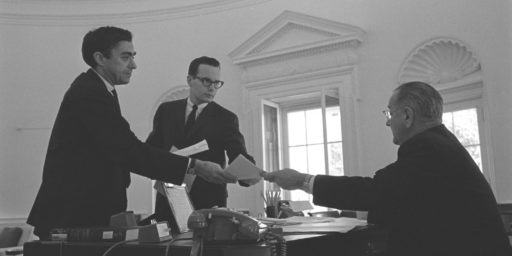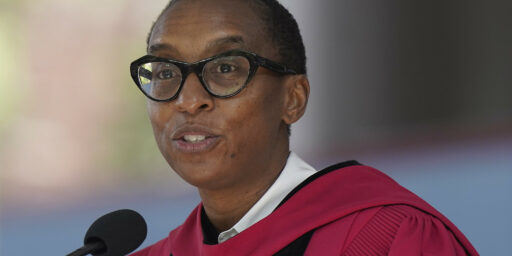Lawrence Tribe – Plagiarist
In his Weekly Standard essay, “The Big Mahatma,” Joseph Bottum thoroughly documents the extent to which Laurence H. Tribe’s 1985 book God Save This Honorable Court borrows from Henry J. Abraham’s 1974 work Justices and Presidents.
POOR HARVARD seems to be going through a spate of such incidents. A national news cycle was generated in 2002 when THE WEEKLY STANDARD broke the story that Doris Kearns Goodwin–a member of Harvard’s Board of Overseers and a former professor of government at the school–had done some serious copying for her 1987 book, The Fitzgeralds and the Kennedys, and then bought off one of the authors from whom she lifted her material. Next, in a more complicated case, Harvard law school’s Alan Dershowitz was accused of overusing a single secondary source for his 2003 book, The Case for Israel. Finally, just a few weeks ago, on September 3, Charles J. Ogletree, Harvard’s Jesse Climenko Professor of Law, admitted on the university’s website that the assistants who’d actually prepared his new All Deliberate Speed:
Reflections on the First Half-Century of Brown v. Board of Education lifted six consecutive paragraphs from a 2001 book by Yale’s Jack M. Balkin.
A rather odd pattern of, at worst, incredible sloppiness and, more likely, academic dishonesty on the part of people who are, by all accounts, brilliant scholars at one of the world’s most prestigious universities. Unlike the Goodwin case or that of the late Stephen Ambrose, Tribe didn’t even bother to footnote the work from which he copied freely and repeatedly.
Abraham himself understands the lure. “The temptation of busy people, big deals, to turn the material over to assistants is very strong,” he told me when we spoke last week. But the “annoying” practice must be stopped, he said–partly because the assistants lack the judgment that the professor is supposed to have, but mostly because it’s wrong: unscholarly and unprofessional. Discussing the dependence of God Save This Honorable Court on Justices and Presidents, Abraham is less than forgiving. “I was aware of what Tribe was doing when I first read his book,” he said. “But I chose not to do anything at the time. I’ve never confronted him–and I was wrong in not following it up. I should have done something about it.” Tribe’s work probably derived from “a combination of being lazy and making a little money. I’m sure his book sold better than mine,” Abraham added. But “he’s a big mahatma and thinks he can get away with this sort of thing.”
Indeed, the now over sixty-year-old Tribe is the big mahatma of American law as well as the great legal champion of the Democratic party. He’s argued thirty-six cases before the Supreme Court, an astonishing number, and they include such landmark cases as the 2000 Bush v. Gore. He just represented the losing side before the Florida Supreme Court in John Kerry’s effort to keep Ralph Nader off the ballot. He’s produced the bestselling textbook American Constitutional Law, now in its third edition. He’s written such books as the 1985 Constitutional Choices and the 1991 Abortion: The Clash of Absolutes. In addition to holding his chair at the law school, Tribe was recently named one of Harvard’s rare “University Professors,” replacing Archibald Cox, who died this spring.
This is indeed a bizarre case. And, of course, one reasonably wonders how much of Tribe’s previous books were plagiarized as well.
In fact, it’s worse than the typical example of a popularizing author’s reliance on other people’s scholarship, for Laurence Tribe is supposed to be a scholar himself. A phone call to Tribe’s Harvard office has not yet been returned. But his credentials are well known. He’s the Tyler Professor of Constitutional Law and a University Professor at Harvard. If these aren’t scholars’ posts, what are? He’s written over a hundred books and articles, according to a blurb on the Harvard website, and “helped draft the Constitutions for South Africa, Russia, the Czech Republic, and the Marshall Islands.” His American Constitutional Law is “the legal text most frequently cited in the second half of the 20th century,” Harvard declares–and quotes the Northwestern Law Review, which gushed: “Never before in American history has an individual simultaneously achieved Tribe’s preeminence both as a practitioner and as a scholar of constitutional law.”
IN OTHER WORDS, he didn’t have to do this. He is a self-described “scholar who values his own integrity and reputation for meticulous attribution as much as anyone could.” But the historians Stephen Ambrose and Doris Kearns Goodwin did much the same thing and were pilloried mercilessly.
Quite so, although both seem to have been rehabilitated. Goodwin was briefly shunned but now appears regularly as a “wise head” on all the talk shows she frequented before her theft came to light. Ambrose’s controversy seemed to die along with him, as his obituaries ignored the charges and miniseries flowing from books he wrote with his name on the cover continue to flow. My guess is Tribe’s career will not be particularly harmed.
(via e-mail tip from Wizbang’s Paul)





